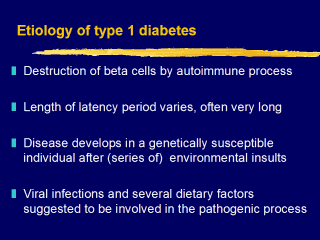| front |1 |2 |3 |4 |5 |6 |7 |8 |9 |10 |11 |12 |13 |14 |review |
 |
Type 1 diabetes
is an autoimmune disease, where the insulin secreting beta cells in the pancreas are
destroyed by the body’s own overaggressive immune defence system. Clinical disease
emerges at a relatively late stage of the beta cell destruction process, and typically
diabetes is diagnosed when approximately 80% of the beta cells have already been
destroyed. It is not well-known, what causes the disease, but it is generally accepted that the process occurs in a genetically susceptible individual after some kind of environmental insults that may affect several stages of the pathogenic process. The length of the latency period from the initiation of the beta cell destruction to the development of disease is thought to vary, and in some cases it may last for decades whereas in others the process may be relatively rapid. Among the environmental factors that have been suggested to affect the development of type 1 diabetes are virus infections and several dietary factors. Vitamin D is one of the rare ’positive’ dietary factors for which there is some evidence that it may reduce disease risk. Why may it be difficcult to investigate the risk factors for type 1 diabetes? |